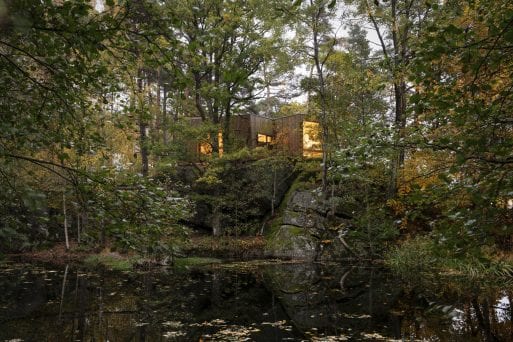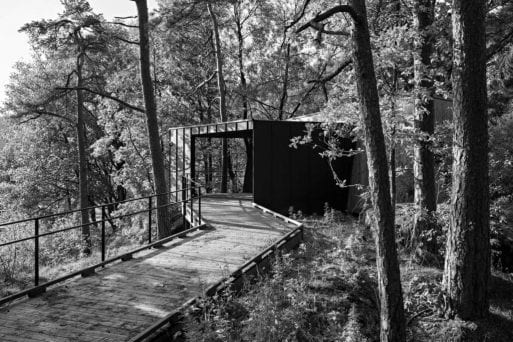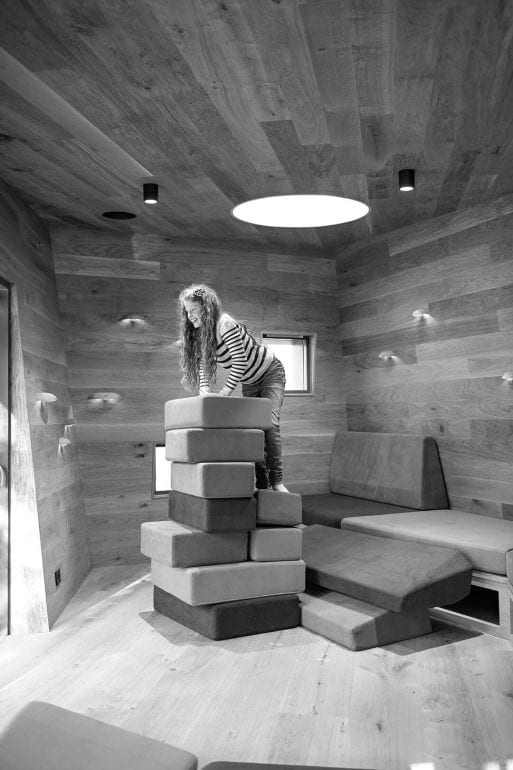
Outdoor Care Retreat
Credit: snohetta.com
Adjacent to a lush forest and the Sognsvann Creek, the Friluftssykehuset (Outdoor Care Retreat) was built just 100 meters from Norway’s largest hospital — Oslo University Hospital, Rikshospitalet. Originally developed in collaboration with the Department of Psychosomatics and CL-Child Psychiatry at Oslo University Hospital, the rustic cabins that comprise the retreat provide a calm, green space where visitors can benefit from the therapeutic qualities of being outside in nature.
The design of the two care retreats was commissioned from international architecture firm Snøhetta by Norway’s charity, the Friluftssykehuset Foundation. (Friluftssykehuset means “Open Air Hospital:” In Norwegian, friluftsliv translates to “being out in nature,” and sykehus means “hospital.”) The Outdoor Care Retreat grew out of research showing that spending time outside can lower the stress hormone cortisol, regulate the nervous system, improve mood, and strengthen immunity.
Oslo University Hospital’s Department of Child and Adolescent Mental Health helps counsel children through treatment and works with young patients across the hospital, many of whom are suffering from chronic illness.

Friluftssykehuset: Outdoor Care Retreat
Credit: designboom.com
Oslo University Hospital doctors, nurses, psychiatrists, and psychologists, doctors and nurses developed plans for cabins at the Outdoor Care Retreat to help children in their sometimes rocky transition into therapy and counseling, as well as to give them a break from the traditional hospital setting.
But only children who were well enough could participate in these trips. With the cabins now in close proximity to the hospital, all of the patients can experience the feeling of being away from the hospital while remaining closeby.
“Bringing patients outside the hospital helps them relax and find the strength to get through their treatment,” said child psychiatrist Maren Østvold Lindheim, who helped spearhead the idea. “Being in nature gives them the feeling of possibility: They have more energy, more hope and more creativity.”

A young patient climbs a tower at the Outdoor Care Retreat.
Credit: snohetta.com
For years prior to the existence of the Outdoor Care Retreat, Lindheim and her colleagues had instinctively been using nature therapy with their young patients, taking them on excursions into the woods near Oslo University Hospital. They would bring groups into the forest to build fires and canoe on a nearby lake.
But children who were very ill could not participate in these outdoor excursions. With the creation of the Outdoor Care Retreat, even patients who are quite ill have access to a natural respite just a block away from the hospital entrance.
“It’s rooted in the Norwegian mentality because we are out in nature so much,” said Lindheim. “We encourage patients to be out and do things to make them stronger. It’s easier for them to go outside than we think.”

 Friluftssykehuset – Oslo University Hospital’s Outdoor Care Retreat
Friluftssykehuset – Oslo University Hospital’s Outdoor Care Retreat


 Terminal Sedation at the End of Life
Terminal Sedation at the End of Life
 National Donate Life Month Reminds Us To Give
National Donate Life Month Reminds Us To Give
 How Dare You Die Now!
How Dare You Die Now!














